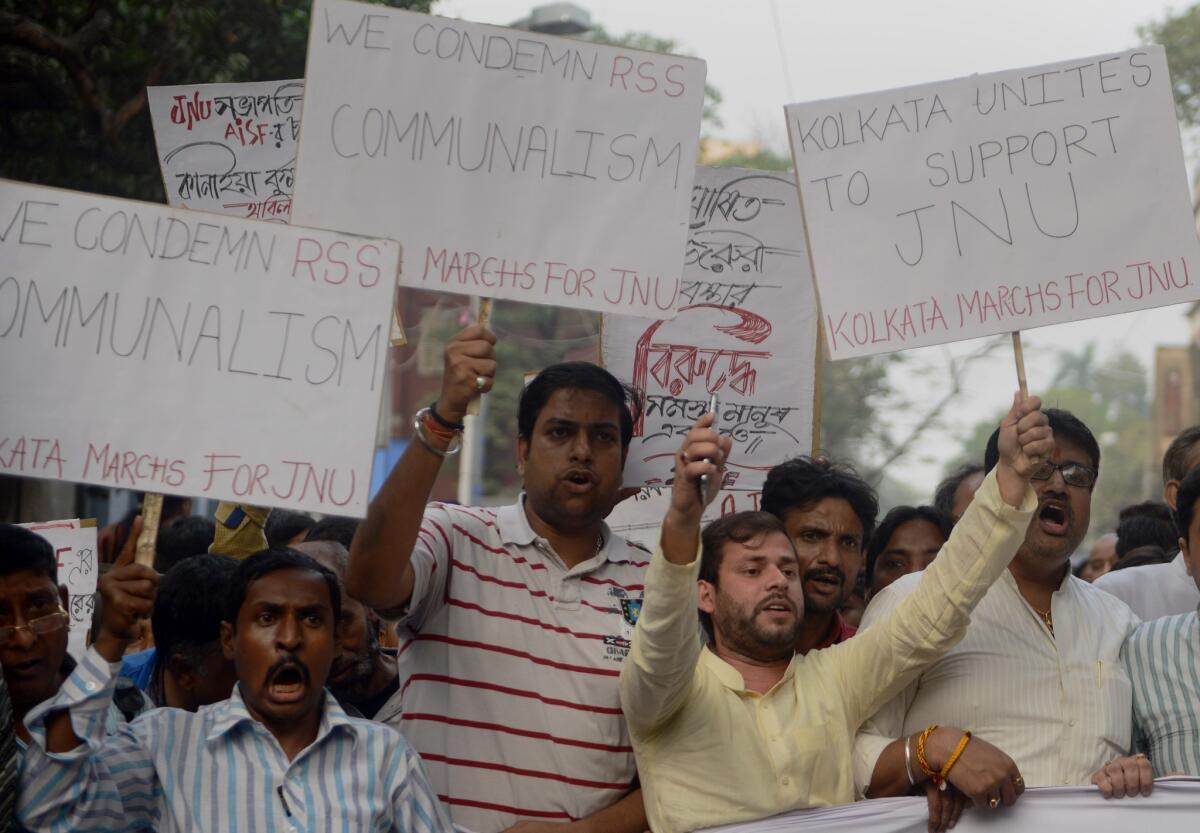An attack on student demonstrators and reporters in India unfolds on social media

Indian Congress and leftist activists shout slogans against the ruling Bharatiya Janata Party government during a joint protest against the arrest of a student from Jawaharlal Nehru University in Kolkata on Feb. 15.
Clashes erupted at a courthouse in India’s capital on Monday, injuring several people, as the fallout from a student demonstration at a liberal university turned violent.
Lawyers and at least one government official reportedly assaulted journalists and students and faculty members of Jawaharlal Nehru University, a public university in New Delhi whose student body president was due to appear at the courthouse to face sedition charges.
The student president, Kanhaiya Kumar, was arrested last week and accused of chanting “anti-national slogans” at a meeting he organized to mark the anniversary of a convicted terrorist’s execution. Students and faculty members said they were roughed up inside a courtroom while several reporters said they came under attack outside the courthouse complex.
Join the conversation on Facebook >>
Critics have pounced on the Indian government for what they describe as a widening crackdown against student protests over the past year. Supporters of the governing Bharatiya Janata Party, a conservative Hindu organization, previously clashed with lower-caste students at a university in southern India and students at a prominent film institute who opposed Prime Minister Narendra Modi’s appointments to the school’s governing body.
In each case, the student demonstrators have been accused by BJP officials and authorities of anti-national behavior. Kumar is the first student to face charges of sedition, under a colonial-era statute that was enacted to protect the country’s former British rulers but is now often used to discipline government critics.
“The government does not want to just crush dissent; it wants to crush thinking, as its repeated assaults on universities demonstrate,” Pratap Bhanu Mehta, president of the independent Center for Policy Research, wrote Monday in The Indian Express.
The drama outside Patiala House Court in New Delhi unfolded on television and social media as reporters were among those assaulted by pro-government activists, some reportedly shouting the slogan, “Bharat Mata Ki Jai,” or “Long Live Mother India.”
Journalists covering the gathering said the attacks took place while a sizable contingent of Delhi police stood by.
ANI, a news agency, posted video of what it said was a state lawmaker from the BJP, O.P. Sharma, and supporters beating up an unidentified man. Sharma, a former top aide to Finance Minister Arun Jaitley, said the man was shouting anti-India slogans but denied assaulting him.
Amey Tirodkar, a reporter for a regional news channel who arrived to cover Kumar’s court appearance, said he saw a few dozen lawyers chanting slogans outside the courthouse.
“I took out my phone to call up the office when a lawyer asked me about my profession,” Tirodkar said in an interview. “The moment I said ‘journalist’, he started beating me up and also told others around him to join in.”
Police were on the scene but “did not even move,” he said.
Journalist Amit Pandey said he was inside the courtroom when a group shouting nationalist slogans pounced on him.
“I guess we were targeted because the journalists have not reported the developing story like a certain people wanted us to,” Pandey said in an interview.
Ayesha Kidwai, a professor at the university, said on Twitter that she and others “are all safe and being evicted from the courtroom under police escort. We have been pushed, sexually harassed but refused to move until the judge ordered it and the police escort came.”
Kabir Singh Nihang, a lawyer who said he was at the courthouse at the time, blamed university students for the scuffle, saying they provoked lawyers with insults.
Tensions have simmered since last week, when anti-India slogans were reportedly shouted at a protest meeting at JNU, long a hotbed of left-wing politics, in memory of Afzal Guru, who was hanged in 2013 for his involvement in an attack on the Indian parliament. At the meeting, Kumar gave a speech that was harshly critical of the government’s actions against liberals but did not include calls for violence, which are illegal under the sedition law.
India’s minister of home affairs, Rajnath Singh, said last week that anyone who “raises anti-India slogans…will not be spared.”
Singh later caused the government some embarrassment when he said that Hafiz Saeed, a Pakistani militant leader who has allegedly masterminded attacks against India, supported the JNU student. A tweet in which Saeed purportedly backed the protest turned out to have come from a parody account, and the militant took to social media on Monday to needle the Indian government.
The fracas has again exposed the fault lines in India over Modi’s polarizing government, which has been accused of favoring majority Hindus and clamping down on religious minorities, journalists and others deemed to oppose its conservative policies.
The Hindu Legal Cell, a pro-government group in New Delhi, congratulated those who “have beaten Afzal supporter JNU students.”
It has also taken media attention away from a weeklong convention the government organized to promote “Make in India,” Modi’s signature initiative to promote the country’s struggling manufacturing sector. Vir Sanghvi, a commentator, said on Twitter: “Sadly the only thing we are making in India these days is violence, divisiveness and hatred.”
Parth M.N. is a special correspondent.
Follow @SBengali on Twitter for more news from South Asia
Sign up for Essential California
The most important California stories and recommendations in your inbox every morning.
You may occasionally receive promotional content from the Los Angeles Times.








